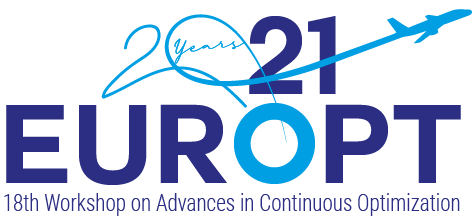WE-01: EUROPT Fellow 2020 Lecture
Room: Fermat
Chair(s): Laura Palagi, Giancarlo Bigi
Nonsmooth Optimization for Classification Problems in Machine Learning
Manlio Gaudioso
Classification is a machine learning technique where the objective is to assign each sample of a given population to exactly one from among several possible classes. Samples are represented by numerical vectors in the space of a certain number of attributes (features) and a classifier is a mathematical tool that is designed starting from a dataset of samples with known class membership (the so called training set). Once the classifier has been built up, it is used to predict the class membership for newly incoming samples. Most of the times classification problems are binary, as the class considered are just two, and constructing the classifier requires solution of a numerical optimization problem to detect an “optimal” separation surface in the sample space. Effective classification methods (e.g. the classic Support Vector Machine one) are based on the use of separating hyperplanes, and the problem at hand is formulated as a (possibly large scale) quadratic program. Nonsmooth optimization comes into the play first when nonlinear separation surfaces are sought, thus we will survey polyhedral, spherical, ellipsoidal and conical separation models. In addition we will focus on some more complex classification problems, where nonsmooth objective functions are to be dealt with. We will consider, in particular: • The semisupervised setting, where class membership is assumed to be known just for a subset of the training set; • The multiple instance learning, where bags of samples instead of single ones are to be classified; • The feature selection process, where sparse classifiers are designed. In all the above cases the optimization problems to be tackled are nonconvex and nonsmooth. Very often, however, they can be put in the DC (Difference of Convex) form. We will also provide the results of some numerical experiments.
